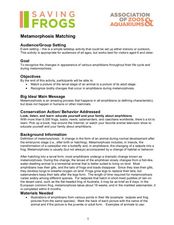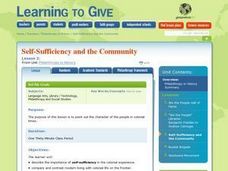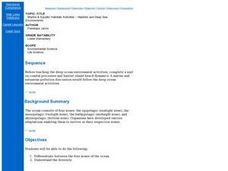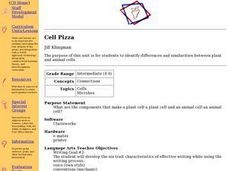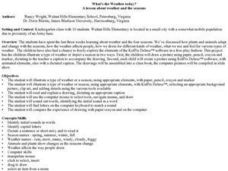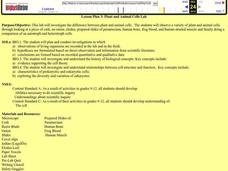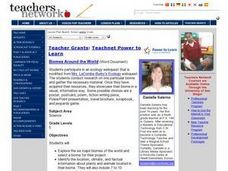Curated OER
Look to the North: A Wolf Pup Diary
Students explore the book, Look To The North: A Wolf Pup Diary. They find five facts about wolves and discuss with their groups. Students explore the timeline of a wolf pup and create a food chain for three of the animals found in the book.
Curated OER
The Intertidal Zone
Students research the diverse animal and plant life that inhabit the intertidal zones along the Pacific rocky coast. As students progress through this lesson, they begin to recognize distinct behaviors, adaptations, and characteristics...
Curated OER
Fungus Among Us- Non-Fiction Reading Comprehension Worksheet
In this fungus non-fiction reading comprehension worksheet, students read a 3 page selection that describes the characteristics and life of fungi. They answer 10 questions based on the reading which include true or false, multiple...
Curated OER
Invertebrates
In this invertebrates worksheet, students read about the characteristics of the different groups of invertebrates. Then students complete 10 multiple choice questions.
Alabama Learning Exchange
The Ocean Floor
Learners explore the ocean in this earth science lesson. They use the Internet to gather information on parts of the ocean including the beach, ocean floor, continental shelf, trenches, and the animals that inhabit these parts.
Curated OER
Metamorphosis Matching
Students view pictures of animals as they complete the metamorphosis from a larva to an adult. In this metamorphosis lesson plan, students view pictures and in the end are able to match pictures of a larva stage to an adult stage in...
Curated OER
Marine Animal and Plant Adaptations
Learners examine nature by creating their own animals. In this animal adaptation lesson, students define scientific vocabulary terms dealing with adaptation such as sea stars, sea cucumbers and exoskeleton. Learners utilize their...
Curated OER
Animal Defenses
In this animal bodies worksheet, 2nd graders study 16 pictures of animals and circle characteristics such as prickly skin or hard shells.
Curated OER
Philanthropy in History Lesson 3: Self-sufficiency And the Community
Students study the characteristic of self-sufficiency in people that lived during Colonial times. They investigate the contemporary movement of Habitat for Humanity. They listen to the story of Donald Hall's, The Oxcart Man and write a...
Curated OER
Habitats and Deep Sea Environments
Students examine and identify the characteristics of the four zones of the ocean. They discover the amount of diversity in marine habitats. They also explore the adaptations organisms have that have allowed them to survive.
Curated OER
African-American Folktales
Students are introduced to the characteristics of folktales and their purpose. As a class, they listen to a folktale, answer questions about the characters and share which part they enjoyed the best. In groups, they compare and...
Curated OER
Mammals
Students examine the characteristics of mammals through video clips, and slide shows. Lesson includes clips of fastest land animal, biggest mammal, loudest mammal and tallest animal.
Curated OER
Prairies
Students identify the basic characteristics of the prairie ecosystem, and several commonly known prairie species. They create a classroom mural of a prairie ecosystem; and create reports about what they have found out.
Curated OER
Cell Pizza
Students identify parts and functions of microscope. Students watch video, Cells and Life about cell parts with actual pictures and actual cells. Students discuss video and identify parts of the cells that animals and plants have in...
Curated OER
Introduction To the Classification of Organisms
Students discuss how scientists classify organisms. In pairs, they analyze and label "specimens" of breakfast cereals in order to classify them into the correct group. They create a dichotomous key for several species of animals.
Curated OER
Weather And The Seasons
Students illustrate characteristics of the different seasons using digital and pen and paper drawings. They creat captions for their drawings and present them to the class. Students compare and contrast their pen and paper drawing...
Curated OER
Plant and Animal Cells
Students investigate the difference between plant and animal cells. They observe a variety o plant and animals cells by looking at a piece of cork, an onion, elodea, prepared slides of paramecium, human bone, frog blood, and human...
Curated OER
Centipede or Millipede?
Students discuss millipedes and centipedes in terms of their classification as arthropod. Using a diagram, students categorize and compare and contrast the characteristics of millipedes and centipedes based on their discussion of...
Curated OER
Biomes Around The World
Fifth graders explore the six major biomes found in the world and choose one for further research and presentation. Using internet sources, they identify the major characteristics of their biome and synthesize their information into a...
Curated OER
Brain POP - Dinosaur
In this earth science worksheet, learners complete a sheet by filling-in each blank with the correct response. They identify various types of dinosaurs and what they ate. Students also identify their various characteristics.
Curated OER
What Makes Up Rocks and Soils?
In this rocks and soils worksheet, students will complete a Venn diagram comparing the specific characteristics of rocks and soils.
Curated OER
Fishes
In this fish learning exercise, students will review the characteristics of fish by comparing the jaws, skeleton, and fertilization of each fish class. Then students will use a phylogenetic tree to compare the groups of fish to ancestral...
Curated OER
Humane Science Projects
In this science worksheet, students examine the list of possible science projects. They look for the characteristics that set apart these ideas as humane.
Curated OER
Amazing Amphibians- Reading Comprehension
In this amazing amphibians learning exercise, students read a one page essay about the characteristics of amphibians. They answer 10 true and false questions based on the reading.







